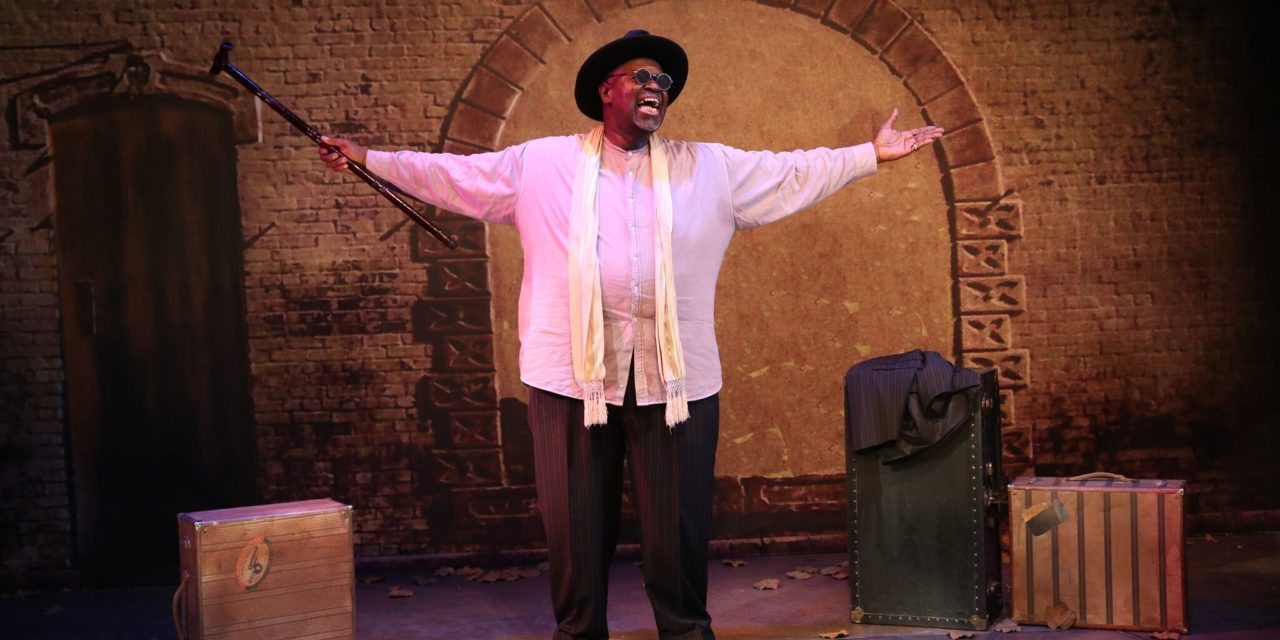If you travel along the New York City underworld of trains and platforms, you’re likely to see a seemingly unremarkable traveler waiting for something that somehow…never comes. As quickly as they are noticed, they are forgotten and relegated to the space filled with other nameless, faceless, storyless beings. This is exactly where we meet Blind Lemon Jefferson at the beginning of Lonesome Blues, as he waits to be picked up in the cold Chicago winter. A blues legend in his own right, he tells the story of his life through the blues, a form of communication lush with longing sentimentality and confusion. As its clearest message, Lonesome Blues captures the profound loneliness of being blind; and, in many ways, the sometimes-unclear language used in the play by Akin Babatundé creates an immersive effect that lets audience members know what it feels like to endure while only getting part of the message. It’s easy to be tricked by this show. For all of the merits of a New York production, Lonesome Blues, which opened at the York Theater Company, could be easily missed by any theatre-goer bound and blinded by what theatre “should be.” It is a story without a compelling and driving storyline. The production offers instead a tableau of a man too easily forgotten and spends the rest of the show coloring in the picture with a dynamic range of expressions that is heartbreakingly authentic to the blues genre.
It wouldn’t be altogether inappropriate to classify the production as a staged blues concert rather than a play or musical. It’s always a bit of a task to find an authentic iteration of genre-hyphenated musicals (disco-musicals, pop-musical, rap-musical), and blues has traditionally been difficult to adapt to musical form because of the depth and language of pain one needs to have to write and act in a work of that genre. Even the critically acclaimed production Lady Day At Emerson’s Bar And Grill, performed by one of the best stage actors on the world, benefited from portraying a character whose blues fame preceded her and garnered a curiosity that drove the story home. The question, then, is what does Lonesome Blues get right? Why this play? The answer is: authenticity. Lonesome Blues is an interesting study on inherent theatricality. The small moments of the book add little to the theatricality of the work, but it does put the inherent theatricality and drama of the blues on full display, unfiltered and unbound. Akin Babatundé delivers a performance that is truly touching, mastering the stage for the entire 90 minutes as Blind Lemon Jefferson. As an exercise in communicating experiences for which words fall short, Lonesome Blues beautifully captures the essence of the blues, and those who know and understand the blues to know will get it. Lonesome Blues is, unfortunately, a bit elusive. My instinct is that only those who have been there know how to get there, and only people who’ve experienced the incomparable depths of the blues can really follow Babatundé’s strikingly beautiful performance to the place where Blind Lemon Jefferson exists.
Lonesome Blues, a New Musical from Alan Govenar & Akin Babatundé, Directed by Katherin Owens runs through July 1st at the York Theater company. For tickets Click HERE.
This post was written by the author in their personal capacity.The opinions expressed in this article are the author’s own and do not reflect the view of The Theatre Times, their staff or collaborators.
This post was written by The Theatre Times.
The views expressed here belong to the author and do not necessarily reflect our views and opinions.


















